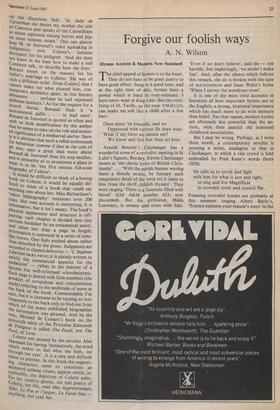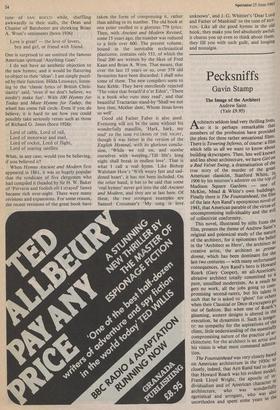Forgive our foolish ways
A. N.
Wilson
Hymns Ancient & Modern New Standard 'The chief appeal of hymns is to the heart.
They do not have to be great poetry to have great effect. Sung to a good tune, and at the right time of day, hymns have a power which is hard to over-estimate. I have never wept at King Lear. But the versi- fying of H. Twells, to the tune ANGELUS, can make me sob like a child after a few bars:
Once more 'tis eventide, and we Oppressed with various ills draw near; What if thy form we cannot see?
We know and feel that thou art here.
Arnold Bennett's Clayhanger has a wonderful scene of a revivalist meeting in St Luke's Square, Bursley. Edwin Clayhanger sneers at 'the classic lyrics of British Chris- tianity' ... 'With the purple banner waving there a bloody motto, he foresaw each sanguinary detail of the verse ere it came to him from the shrill childish throats'. They were singing 'There is a fountain filled with blood' (Old A&M number 633; now discarded). But his girlfriend, Hilda Lessways, is uneasy and cross with him. `Even if we don't believe', said she — not harshly, but imploringly, 'we needn't make fun'. And, after the silence which follows this remark, the air is broken with the tune of ROCKINGHAM and Isaac Watts's hymn 'When I survey the wondrous cross'.
It is one of the most vivid accounts in literature of how important hymns are to the English; a strong, irrational importance which has much more to do with memory than belief. For that reason, modern hymns are obviously less powerful than the an- cient, with their painful old irrational childhood associations.
But I may be wrong. Perhaps, as I write these words, a contemporary novelist is penning a scene, analagous to that in Clayhanger, in which a vast crowd is held enthralled by Fred Kaan's words (born 1929):
He calls us to revolt and fight with him for what is just and right, to sing and live Magnificat in crowded street and council flat.
Foaming revivalist hordes are probably at this moment singing Albert Bayly's, 'Science explores your reason's ways' to the
tune of SAN ROCCO while, shuffling awkwardly in their stalls, the Dean and Chapter of Barchester are shrieking Brian A. Wren's sentiments (born 1936)
Love is great! — the love of lovers, boy and girl, or friend with friend.
One is surprised to see omitted the famous American spiritual 'Anything Goes'.
I do not have an aesthetic objection to the new hymns; and it would be flattering to object to their 'ideas'. I am simply puzzl- ed by their function. Hilda Lessways, listen- ing to the 'classic lyrics of British Chris- tianity' said, 'even if we don't believe, we needn't make fun'. With 100 Hymns for Today and More Hymns for Today, the wheel has come full circle. Even if you do believe, it is hard to see how you could possibly take seriously verses such as those of Richard G. Jones (born 1926):
Lord of cable, Lord of rail, Lord of motorway and mail, Lord of rocket, Lord of flight, Lord of soaring satellite What, in any case, would you be believing, if you believed it?
When Hymns Ancient and Modern first appeared in 1861, it was so hugely popular that the syndicate of five clergymen who had compiled it (headed by Sir H. W. Baker of 'Perverse and foolish oft I strayed' fame) became rich over-night. There were many revisions and expansions. For some reason, the recent revisions of the great book have taken the form of compressing it, rather than adding to its number. The old book at one point swelled to a glorious 779 lyrics. Then, with Ancient and Modern Revised, some 15 years ago, the number was reduced to a little over 600. The present volume, bound in the inevitable ecclesiastical plasticette, contains only 533, of which the final 200 are written by the likes of Fred Kaan and Brian A. Wren. That means, that over the last 15 years or so, over 379 old favourites have been discarded. I shall miss some of them. The new compilers seem to hate Keble. They have mercilessly rejected `The voice that breath'd o'er Eden', 'There is a book who runs may read', and that beautiful Tractarian stand-by 'Shall we not love thee, Mother dear, Whom Jesus loves so well'.
Good old Father Faber is also axed. Evensong will not be the same without his wonderfully maudlin, 'Hark, hark, my soul' to the tune PILGRIMS OF THE NIGHT, though it was better in the version of the English Hymnal, with its glorious conclu- sion, 'While we toil on, and soothe ourselves with weeping,/Till life's long night shall break in endless love'. That is what 1 call a real hymn. Like Bishop Walsham How's 'With weary feet and sad- dened heart', it has not been included. On the other hand, it has to be said that some 'real hymns' never got into the old Ancient and Modern, and they are at last here. Of these, the two strongest examples are Samuel Crossman's 'My song is love unknown', and J. G. Whittier's 'Dear Lord and Father of Mankind' to the tune of REP- TON. Like all the good hymns in the old book, they make you feel absolutely awful; it churns you up even to think about them, they fill you with such guilt, and longing and nostalgia.



















































 Previous page
Previous page